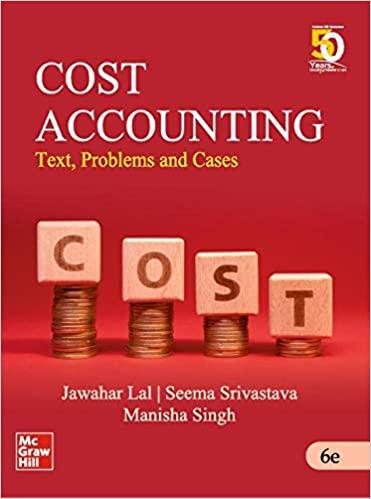Question
Create an income statement and balance sheet for the year ending December 31, 2011, to see whether Food Group could generate the profit targeted by
Create an income statement and balance sheet for the year ending December 31, 2011, to see whether Food Group could generate the profit targeted by the Daughter and Father, and if so, whether it could pay dividends.
Information:
A daughter and father want to start a new company together. Before they proceed, they want to evaluate their financial feasibility. They hope their new company, the Food Group, could earn a profit of $50,000 in its first year of operations, with plans to grow profits by 20% each subsequent year.
Daughter and father planned to invest $25,000 each, receiving 1,000 common shares in return. The largest portion of this capital investment would be used to obtain a patent on their products production process.
It is estimated the drafting of this patent would cost $10,000, and the cost to prosecute the patent into issuance would be $12,000. The Food Group would also incur fees, estimated to total $8,000, to incorporate the business, obtain a business license, and complete name registration. These start-up costs would be expensed in the Food Groups first fiscal year.
Daughter believed an alliance with another company, Awesome Companies, would be beneficial. This agreement would use the Daughter and Fathers product in the production of several of Awesome Companies products.
Projected Sales and Costs:
Sales:
In its first year of operations, all Food Group sales would be made to Awesome Companies on credit. Food Group agreed to offer Awesome Companies credit terms of net 60.
Food Group purchased a product from its American distributor on account, and the American supplier extended credit terms of net 30.
Food Group planned to rent office space, which would be $999 a month for a three-year term and required immediate payment of both first and last months rent.
The office space needed some furnishings and fixtures, so Daughter budgeted $5000 for these items.
The furniture and fixtures would be depreciated using the straight-line method and had an estimated useful life of five years with no residual value.
Another $4,500 would be spent on computer equipment, which would be depreciated using the double declining balance method over an estimated useful life of four years, assuming a residual value of $500.
Other anticipated annual costs are listed in the chart below, to be paid in full by fiscal year-end. Any income taxes owing would have to be paid two months after the fiscal year ended, ie. December 31.
Daughter decided she would work full-time for Food Group as its only employee. She projected a $40,000 salary for herself in Food Groups first year of operations. Daughter and Father were also interested in receiving dividends from the Food Group, but thought it would be best to wait until after the first year of operations to see whether the business had sufficient cash and retained earnings to pay any dividends.
Chart of other anticipated annual costs:
| Advertising | $3,000 |
| Utilities | 1200 |
| Printing | 440 |
| Travel | 2,250 |
| Insurance | 800 |
| Phone and Internet | 770 |
| Office Supplies | 340 |
| Miscellaneous | 500 |
| Total | $9,300 |
Step by Step Solution
There are 3 Steps involved in it
Step: 1

Get Instant Access to Expert-Tailored Solutions
See step-by-step solutions with expert insights and AI powered tools for academic success
Step: 2

Step: 3

Ace Your Homework with AI
Get the answers you need in no time with our AI-driven, step-by-step assistance
Get Started


